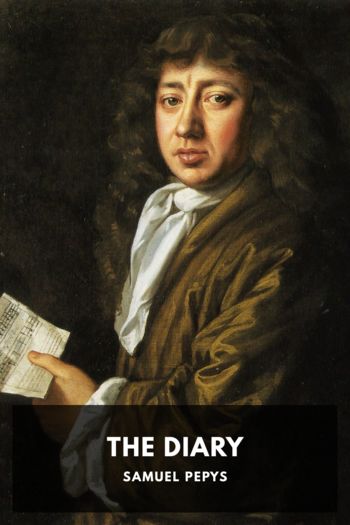The Diary, Samuel Pepys [e reader books TXT] 📗

- Author: Samuel Pepys
Book online «The Diary, Samuel Pepys [e reader books TXT] 📗». Author Samuel Pepys
More worth than all my Father’s spoiles;
But now, she is become my punishment.
But thou art just, O Pow’r divine,
With niew and painfull arts
Of studied warr, I breake the hearts
Of half the world, and shee breakes mine.”
↩
Genest, in his History of the British Stage, vol. i, enumerates sixteen characters filled by Mrs. Knipp, at the King’s House, between 1664 and 1678, when she disappears from the playbills, in which her name is spelt in six different ways. The details in the Diary respecting this lively actress and “her brute of a husband,” whom Pepys describes as a “horse jockey,” are so amusing, that any particulars of their subsequent history would have been interesting. ↩
Sister of Mrs. Clerke, wife of Dr. Clerke. See February 13th, 1666–67. ↩
When Lord Sandwich was away a new commander had to be chosen, and rank and long service pointed out Prince Rupert for the office, it having been decided that the heir presumptive should be kept at home. It was thought, however, that the same confidence could not be placed in the prince’s discretion as in his courage, and therefore the Duke of Albemarle was induced to take a joint command with him, “and so make one admiral of two persons” (see Lister’s Life of Clarendon, vol. ii, pp. 360, 361). ↩
“Sir Robert Viner’s chief man” (see September 30th, 1665). ↩
The passage between brackets is from a piece of paper inserted in this place. ↩
Mr. Lethieulier’s wife was Anne, daughter of Sir William Hooker (see October 14th, 1666), and his wife Mary, daughter of Thomas Gipps, or Gibbs, of London. ↩
Edmund Hinton, a goldsmith in Lombard Street (Ellis’s Original Letters, 3rd series, vol. iv, p. 310). ↩
John Hinton, M.D., a strong royalist, who attended Henrietta Maria in her confinement at Exeter when she gave birth to the Princess Henrietta. He was knighted by Charles II, and appointed physician in ordinary to the king and queen. His knighthood was a reward for having procured a private advance of money from his kinsman, the goldsmith, to enable the Duke of Albemarle to pay the army (see “Memorial to King Charles II from Sir John Hinton, A.D. 1679,” printed in Ellis’s Original Letters, 3rd series, vol. iv, p. 296). ↩
James Houblon. ↩
Captain Hugh Seymour, of the Foresight (fourth rate), who was killed in the action of July, 1666 {see post, July 29th). ↩
According to Granville Penn (Memorials of Sir W. Penn, ii 488 n.) £2,000 went to Lord Sandwich and £8,000 among eight others. ↩
This document is in the British Museum (Harleian MS. 6287), and is entitled, “A Letter from Mr. Pepys, dated at Greenwich, 1 Jan. 1665–6, which he calls his New Year’s Gift to his hon. friend, Sir Wm. Coventry, wherein he lays down a method for securing his Majesty in husbandly execution of the Victualling Part of the Naval Expense.” It consists of nineteen closely written folio pages, and is a remarkable specimen of Pepys’s business habits. —B. There are copies of several letters on the victualling of the navy, written by Pepys in 1666, among the Rawlinson MSS. in the Bodleian. ↩
The Scottish ballad is entitled, “Sir John Grehme and Barbara Allan,” and the English version, “Barbara Allen’s Cruelty.” Both are printed in Percy’s Reliques, Series III. ↩
A song called “Dapper Dicky” is in the British Museum; it begins, “In a barren tree.” It was printed in 1710. —B. ↩
“This Duchess was Chancellor Hyde’s daughter, and she was a very handsome woman, and had a great deal of wit; therefore it was not without reason that Mr. Sydney, the handsomest youth of his time, of the Duke’s bedchamber, was so much in love with her, as appeared to us all, and the Duchess not unkind to him, but very innocently. He was afterwards banished the Court for another reason, as was reported.”
Sir John Reresby’s Memoirs, August 5th, 1664, ed. Cartwright, pp. 64,65“ ‘How could the Duke of York make my mother a Papist?’ said the Princess Mary to Dr. Bumet. ‘The Duke caught a man in bed with her,’ said the Doctor, ‘and then had power to make her do anything.’ The Prince, who sat by the fire, said, ‘Pray, madam, ask the Doctor a few more questions’ ”
Spence’s Anecdotes, ed. Singer, 329↩
December 28th, 1665. In a Fellow’s chamber in Merton College, Oxford, of George Fitzroy, afterwards Duke of Northumberland. —B. ↩
Admiral Sir Jeremy Smith, mentioned October 13th, 1665, ante, commanded a fleet in the Streights at this time, and another in the Channel in 1668. —B. ↩
Make bows, play the courtier. The reading, “make leagues,” appeared in former editions till Mr. Mynors Bright corrected it. ↩
Alexander Brome. ↩
Anthony Lowther, of Marske, in Yorkshire, one of the original Fellows of the Royal Society, who shortly afterwards married Margaret Penn, was M.P. for Appleby in 1678 and 1679. He was buried at Walthamstow in 1692. William, his son by Margaret Penn, created a baronet in 1697, married the heir of Thomas Preston, of Holker, Lancashire. The second baronet married Elizabeth, daughter of William, Duke of Devonshire, and their son, dying unmarried, bequeathed Holker and other estates to his cousin, Lord George Cavendish. ↩
The Royal Society did not meet until February 21st, having had a specially long recess on account of the plague. At the previous meeting on June 28th, 1665, “Mr. Hooke was ordered to





Comments (0)